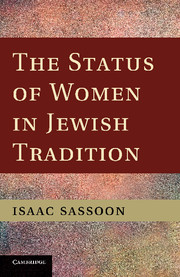Book contents
- Frontmatter
- Contents
- Preface
- Acknowledgements
- Glossary
- Abbreviations
- PART I MONOGAMY
- PART II COMMANDMENTS (MIṢVOT)
- PART III INTRINSIC EQUALITY
- Conclusion
- Bibliography
- Index of Authors (Medieval & Pre-modern)
- Index of Citations from Rabbinic Literature
- Index of Names (Hebrew Bible)
- Index of Names (Talmudic)
- General Index
PART III - INTRINSIC EQUALITY
Published online by Cambridge University Press: 01 June 2011
- Frontmatter
- Contents
- Preface
- Acknowledgements
- Glossary
- Abbreviations
- PART I MONOGAMY
- PART II COMMANDMENTS (MIṢVOT)
- PART III INTRINSIC EQUALITY
- Conclusion
- Bibliography
- Index of Authors (Medieval & Pre-modern)
- Index of Citations from Rabbinic Literature
- Index of Names (Hebrew Bible)
- Index of Names (Talmudic)
- General Index
Summary
Introduction
In the beginning was inclusiveness, and the midrash says so:
Before the Land of Israel was chosen all lands were eligible for revelation; once the Land of Israel was chosen all [other] lands were disqualified. Before Jerusalem was chosen the entire Land of Israel was eligible for altars; once Jerusalem was chosen [the rest of] the Land of Israel was disqualified. … Before the Temple was chosen Jerusalem was a place fit for the shekhinah; once the Temple was chosen [the rest of] Jerusalem was disqualified. … Before Aaron was chosen all Israel were eligible for priesthood; once Aaron was chosen all [the rest of] Israel was disqualified. … Before David was chosen all Israel were eligible for kingship; once David was chosen all [the rest] of Israel was disqualified.
Amidst all this axing and circumscription, women go unnoticed. But to infer from this silence that the Mekhilta meant to allow for Aaronide priestesses is probably wishful thinking. More likely, women were simply ‘off the radar’. On the other hand, we must not forget those rabbinic texts such as Sifra to Lev 17:6 that quite explicitly sanction women officiating at the bamot. Now according to the Mishnah (Zev. 14:4–8), bamot enjoyed intermittent legitimacy prior to the centralization of the cult in the Solomonic temple. Without using the word bamot, our Mekhilta citation says as much: “[B]efore Jerusalem was chosen the entire land of Israel was eligible for altars”.
- Type
- Chapter
- Information
- The Status of Women in Jewish Tradition , pp. 119 - 123Publisher: Cambridge University PressPrint publication year: 2011



